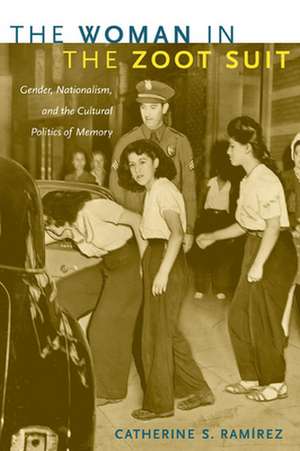The Woman in the Zoot Suit – Gender, Nationalism, and the Cultural Politics of Memory
Autor Catherine S. Ramírezen Limba Engleză Paperback – 15 ian 2009
Preț: 204.87 lei
Nou
Puncte Express: 307
Preț estimativ în valută:
39.20€ • 40.93$ • 32.44£
39.20€ • 40.93$ • 32.44£
Carte tipărită la comandă
Livrare economică 04-18 aprilie
Preluare comenzi: 021 569.72.76
Specificații
ISBN-13: 9780822343035
ISBN-10: 0822343037
Pagini: 256
Ilustrații: 31 illustrations
Dimensiuni: 156 x 236 x 18 mm
Greutate: 0.38 kg
Ediția:New.
Editura: MD – Duke University Press
ISBN-10: 0822343037
Pagini: 256
Ilustrații: 31 illustrations
Dimensiuni: 156 x 236 x 18 mm
Greutate: 0.38 kg
Ediția:New.
Editura: MD – Duke University Press
Cuprins
Preface; Acknowledgments; A Note on Terminology Introduction: A Genealogy of Vendidas; 1. Domesticating the Pachuca; 2. Black Skirts, Dark Slacks, and Brown Knees: Pachuca Style and Spectacle during World War II; 3. Saying Nothin: Pachucas and the Languages of Resistance; 4. La Pachuca and the Excesses of Family and Nation; Epilogue: Homegirls Then and Now, from the Home Front to the Frontline Notes; Bibliography; Index
Recenzii
In this engaging and perceptive book, Catherine S. Ramírez locates Mexican American women zoot suiters (pachucas) in wartime zoot-suit culture and the cultural politics of Chicano nationalism. This original study provides a new cultural lens for envisioning the network of social relationships, identifications, and symbolic investments gathered around the historical figure of the pachuca.Rosa-Linda Fregoso, author of MeXicana Encounters: The Making of Social Identities on the BorderlandsPowerful and innovative, The Woman in the Zoot Suit will serve as a foundational text for future studies on culture, race, gender, and sexuality. Catherine S. Ramírez expertly reveals the complexities of pachuca identity, the extent of Mexican American women zoot suiters representation in and engagement with popular culture and mainstream media, and, ultimately, the ways that these young women disrupted dominant notions of U.S., Mexican American, and Chicana/o identity, nationalism, and family.Luis Alvarez, author of The Power of the Zoot: Youth Culture and Resistance during World War IIThis engrossing, unexpectedly timely study of the politics of cultural nationalism resurrects the hidden history of la pachuca, the female counterpart to the 1940s pachuco, the zoot suitwearing Mexican-American hipster made notorious by two consecutive wartime flashpoints... A vital addition for those interested in American ethnic and cultural studies as well as studies of sexuality and visual culture, this book speaks forcefully to current Obama-era and postProp 8 debates over race, ethnicity, sexuality, patriotism and citizenship. -- Publishers Weekly, 22/12/2008
"In this engaging and perceptive book, Catherine S. Ramirez locates Mexican American women zoot suiters (pachucas) in wartime zoot-suit culture and the cultural politics of Chicano nationalism. This original study provides a new cultural lens for envisioning the network of social relationships, identifications, and symbolic investments gathered around the historical figure of the pachuca."--Rosa-Linda Fregoso, author of MeXicana Encounters: The Making of Social Identities on the Borderlands "Powerful and innovative, The Woman in the Zoot Suit will serve as a foundational text for future studies on culture, race, gender, and sexuality. Catherine S. Ramirez expertly reveals the complexities of pachuca identity, the extent of Mexican American women zoot suiters' representation in and engagement with popular culture and mainstream media, and, ultimately, the ways that these young women disrupted dominant notions of U.S., Mexican American, and Chicana/o identity, nationalism, and family."--Luis Alvarez, author of The Power of the Zoot: Youth Culture and Resistance during World War II "This engrossing, unexpectedly timely study of the politics of cultural nationalism resurrects the hidden history of la pachuca, the female counterpart to the 1940s pachuco, the zoot suit-wearing Mexican-American hipster made notorious by two consecutive wartime flashpoints... A vital addition for those interested in American ethnic and cultural studies as well as studies of sexuality and visual culture, this book speaks forcefully to current Obama-era and post-Prop 8 debates over race, ethnicity, sexuality, patriotism and citizenship." -- Publishers Weekly, 22/12/2008 "Ramirez's work excavates the images, silences, and voices of the young and often misunderstood zoot-suit-wearing pachucas of the 1940s and offers a redeeming and complex portrait of their legacy...Recovering the historical and symbolic significance of the pachucas takes creativity and resourcefulness, for few sources remain that speak to the experiences of young Mexican-American women in the twentieth century. Finding records of racialized and criminalized young women such as the pachucas is especially difficult...The Woman in the Zoot Suit is significant not only for its ability to draw links among gender, culture, and nationalisms but also for its contribution to Chicana, women's, and American studies. Ramirez brings together a wide range of sources and methodological approaches to recover the images, voices, and silences of the much maligned and misunderstood pachucas. More importantly, she illuminates the larger meaning and significance of the pachucas' dress, language, and self-censorship. In so doing, she provides a model of what it means to work in multiple disciplines to create a narrative that does justice to her subjects. The book contains never-before published photos and is written in an easy-to-read style with minimal jargon. For these reasons, The Woman in the Zoot will appeal to a wide audience, including scholars, feminists, students of the Chicano and Chicana movement, and the general public." Miroslava Chavez-Garcia, Women's Review of Books, Summer 2009
"In this engaging and perceptive book, Catherine S. Ramirez locates Mexican American women zoot suiters (pachucas) in wartime zoot-suit culture and the cultural politics of Chicano nationalism. This original study provides a new cultural lens for envisioning the network of social relationships, identifications, and symbolic investments gathered around the historical figure of the pachuca."--Rosa-Linda Fregoso, author of MeXicana Encounters: The Making of Social Identities on the Borderlands "Powerful and innovative, The Woman in the Zoot Suit will serve as a foundational text for future studies on culture, race, gender, and sexuality. Catherine S. Ramirez expertly reveals the complexities of pachuca identity, the extent of Mexican American women zoot suiters' representation in and engagement with popular culture and mainstream media, and, ultimately, the ways that these young women disrupted dominant notions of U.S., Mexican American, and Chicana/o identity, nationalism, and family."--Luis Alvarez, author of The Power of the Zoot: Youth Culture and Resistance during World War II "This engrossing, unexpectedly timely study of the politics of cultural nationalism resurrects the hidden history of la pachuca, the female counterpart to the 1940s pachuco, the zoot suit-wearing Mexican-American hipster made notorious by two consecutive wartime flashpoints... A vital addition for those interested in American ethnic and cultural studies as well as studies of sexuality and visual culture, this book speaks forcefully to current Obama-era and post-Prop 8 debates over race, ethnicity, sexuality, patriotism and citizenship." -- Publishers Weekly, 22/12/2008 "Ramirez's work excavates the images, silences, and voices of the young and often misunderstood zoot-suit-wearing pachucas of the 1940s and offers a redeeming and complex portrait of their legacy...Recovering the historical and symbolic significance of the pachucas takes creativity and resourcefulness, for few sources remain that speak to the experiences of young Mexican-American women in the twentieth century. Finding records of racialized and criminalized young women such as the pachucas is especially difficult...The Woman in the Zoot Suit is significant not only for its ability to draw links among gender, culture, and nationalisms but also for its contribution to Chicana, women's, and American studies. Ramirez brings together a wide range of sources and methodological approaches to recover the images, voices, and silences of the much maligned and misunderstood pachucas. More importantly, she illuminates the larger meaning and significance of the pachucas' dress, language, and self-censorship. In so doing, she provides a model of what it means to work in multiple disciplines to create a narrative that does justice to her subjects. The book contains never-before published photos and is written in an easy-to-read style with minimal jargon. For these reasons, The Woman in the Zoot will appeal to a wide audience, including scholars, feminists, students of the Chicano and Chicana movement, and the general public." Miroslava Chavez-Garcia, Women's Review of Books, Summer 2009
Notă biografică
Catherine S. Ramírez
Textul de pe ultima copertă
"Powerful and innovative, "The Woman in the Zoot Suit" will serve as a foundational text for future studies on culture, race, gender, and sexuality. Catherine S. Ramirez expertly reveals the complexities of pachuca identity, the extent of Mexican American women zoot suiters' representation in and engagement with popular culture and mainstream media, and, ultimately, the ways that these young women disrupted dominant notions of U.S., Mexican American, and Chicana/o identity, nationalism, and family."--Luis Alvarez, author of "The Power of the Zoot: Youth Culture and Resistance during World War II"
Descriere
Recovers the neglected history of young Mexican American women zoot-suiters in wartime Los Angeles and explains their absence from Chicano movement narratives












